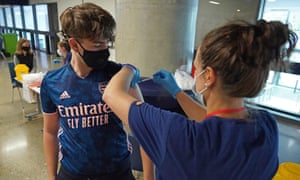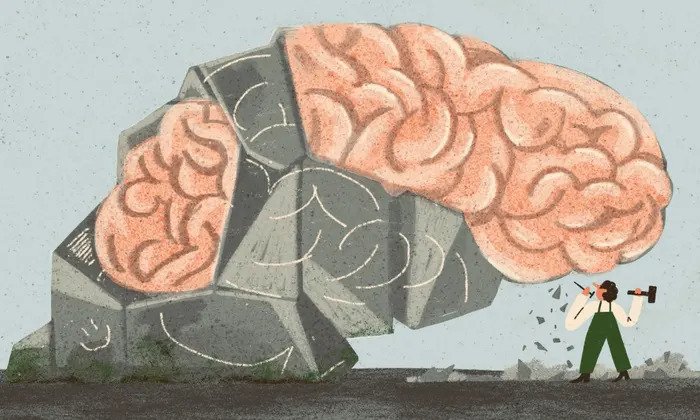Last modified on 2021 Jun 24
–
I can pinpoint the exact moment that I realized my brain was still broken from the pandemic.
–
A few weeks ago, while riding the train, I decided to send off a few overdue email replies. Fast forward 45 minutes, and there I was: sitting cross-legged on my destination platform, email forgotten, frantically toggling between tabs. It was, by now, a grimly familiar experience of my pandemic-era cognitive performance.
–
Beginning in the spring of last year, with the first lockdown, I’d often get distracted and overwhelmed, then lose the plot of my task – a common Covid-era affliction. (The simple act of folding laundry became a slapstick-worthy fiasco.) But now I was fully vaccinated, making plans, and even socializing indoors again. Life was starting to appear almost, well, normal. I felt good. Why had my brain missed the memo – and could I get my trusty pre-pandemic brain back?
Vaccination rates in the US, UK and beyond are on the rise, inviting more and more of us to shed our cocoons and engage more fully with the outside world than we have in over a year. For some people, that may mean diving headfirst into the bacchanalia of a hot vax summer. For others, like me, it also means reckoning with the lingering sluggishness of pandemic cognition. The good news is that our brains are extremely plastic, and therefore capable of repair. We can even help the process along.
“It’s going to take us some time to recover from it,” says Mike Yassa, the director of the UC Irvine Center for the Neurobiology of Learning and Memory and the UCI Brain Initiative. “It” being the subtle, but frustrating, mental deterioration many of us have incurred over the course of the pandemic. Or, as the phenomenon has come to be known: “pandemic brain.”
It is now common knowledge that stress can be hazardous to our physical health, especially when experienced over a protracted period of time. Prolonged exposure to cortisol, the body’s primary stress hormone, increases the risk of heart disease, sleep disruptions and even mood disorders like anxiety and depression. Cognition suffers, too. Chronic stress has been found to kill brain cells and even shrink the size of your prefrontal cortex, the part of your brain responsible for memory, focus and learning.
In the weeks and months after initial lockdown, people began to notice a sudden inability to focus, remember things and follow through on tasks. “It’s not just you,” headlines reassured us, as “smooth brain” memes swept the internet. More recently, a high-profile article in the Atlantic investigated the late-pandemic “fog of forgetting” and suggested that our circumstantial memory holes were an adaptive response to the endless unknown.
As Yassa tells me, the pandemic hasn’t merely been a stressful event. It’s been a collection of many simultaneous stressors, some of them life-threatening, that have been compounded by disruptions in our physical activity, daily rhythms, and routines, and stretched out over many months. Yassa thinks we’re finally “on the trajectory to recovery”, though it won’t happen instantaneously. Perhaps sensing my disappointment, he reminds me: “We didn’t get here overnight.”
Researchers have begun to get a sense of the ways our brains have been altered by 18 months of social distancing and uncertainty (literally, physically in the case of some people who received treatment for serious Covid infections and showed reduced gray matter volume).
Barbara Sahakian, a professor of clinical neuropsychology at the University of Cambridge, has been working in partnership with Fudan University (Shanghai) researchers to assess the effects of social isolation and loneliness on people’s brains during the pandemic. She says that the impacts, across multiple regions of the brain, are “profound”.
“We’ve seen changes in volume in the brain’s temporal, frontal, occipital and subcortical regions, the amygdala, and the hippocampus in people who are socially isolated,” says Sahakian. Volume loss in any or all of these areas could be seriously detrimental to the processes we rely on to engage with others and the world around us.
I think of a tragicomic episode from my own life, sometime this past winter, when I met up with a friend at a nearby hardware store to shop for houseplants. It took us an hour, and a few fraught exchanges, to figure out which plants we wanted and what we would need to buy in order to hang them. We must have resembled kidnap survivors newly released from subterranean bunkers, relearning the basics of navigating the outside world.
It’s worth remembering that different people have had vastly different pandemic experiences. As a healthy, childless thirtysomething who was able to continue my job from the safety of home, my road to cognitive recovery may be smoother than for a frontline medical worker with post-traumatic stress symptoms, or a single parent of young children.
Yet there may be commonalities among these experiences. Sahakian has examined categories of people ranging from medical workers to those who never had Covid but were in lockdown. Across groups, people reported difficulty with concentration and memory. Many also reported symptoms of depression.
“People do have resilience,” she says. “But there will be a portion of people who have been greatly affected, who may continue to show those [cognitive changes] into the future.”
Despite the sweeping cognitive impacts of the past year, Sahakian and others in her field are optimistic about our prospects for recovery. Even an unprecedented global health crisis can have its effects be mitigated by good old fashioned mental hygiene.
Sweat it out
We all guiltily know that we should be moving more, and reaping in the sweet endorphin rewards of our activity. There’s ample evidence that physical activity improves cognitive functioning, too. Exercise increases neuroplasticity – or, the brain’s adaptability to experience and change – which may aid in preventing future neurodegenerative conditions like dementia, in addition to accelerating our brain’s bounce back from recent circumstances.
The sweet sound of recovery
Efthymios Papatzikis, a professor at the Oslo Metropolitan University who studies the neuroscience of music, says that simply listening to music increases oxytocin production, which generally contributes to feelings of empathy and goodwill. Music has also been shown to lower cortisol levels in the body.
“We don’t know exactly how that happens, but we’ve seen the impact,” he says. As long as one enjoys the music they’re listening to, it’s a win. Making music, whether by singing or playing a musical instrument, is even better; both have been linked to improved cognitive resilience later in life.
Though Papatzikis errs on the side of simple, melody-forward tunes for stress reduction, any music that the listener finds pleasing can produce therapeutic effects. Going on a 30-minute walk soundtracked by Britney will do just fine, if that’s your jam.
Free your head
Mood and cognitive function often go hand in hand. Mindfulness and meditation have been linked to improvements on both fronts, easing stress and enhancing automatic cognition processes like memory retrieval.
Exercises like focused-attention meditation and conscious breathing redirect a person’s attention to a single object or sensation. This practice of “being in the moment” can counter the experience of overwhelm in the near term and, longer term, helps nip ruminative thought patterns in the bud.
“So,” Sahakian advises, “take notice and be curious of the world around you, and spend time in the moment.”
Spending time in the moment will likely require patience – with ourselves and the people around us – while we reenter the social world. As I attend my first pandemic parties and shake new acquaintances’ hands for the first time since 2019, I’m trying to cut myself some slack for my lapsed social graces. Even when it involves repeating the same factoid about Mexican telenovela star Verónica Castro three times in a single conversation.
This is a time of return, after all. We haven’t arrived yet, but we will get there. Our brains will, too. [Hopefully…]
–
–
Topics
Most viewed
-

Why most people who now die with Covid in England have been vaccinated – David Spiegelhalter and Anthony Masters











